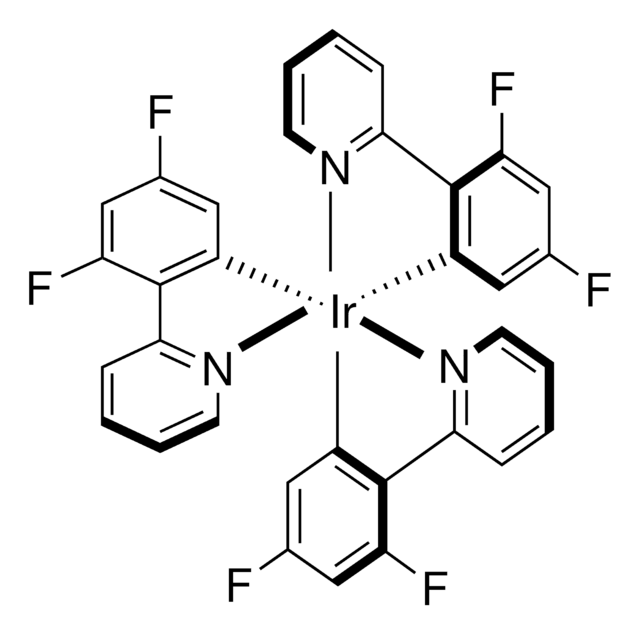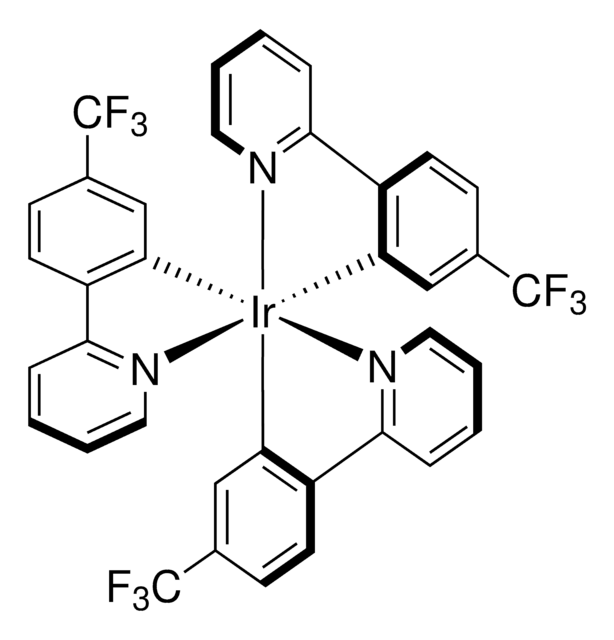694924
Tris[2-phenylpyridinato-C2,N]iridium(III)
sublimed grade
Synonym(s):
Ir(ppy)3, Iridium, tris[2-(2-pyridinyl-κN)phenyl-κC]
About This Item
Recommended Products
grade
sublimed grade
Quality Level
form
powder
loss
0.5% loss on heating, 359°C (typical, TGA)
transition temp
transition temp 437.6 °C (typical, DSC)
λmax
282 nm
fluorescence
λex 305 nm; λem 507 nm in chloroform
Orbital energy
HOMO 5.6 eV
LUMO 3 eV
OLED Device Performance
ITO/HMPD/TAZ:Ir(ppy)3 (7%)/Alq3/Al:Li
ITO/NPD/CBP:Ir(ppy)3 (6%)/Alq3/Mg:Ag
ITO/NPD/TCTA/BCPO:Ir(ppy)3 (7-8%)/BCP/Alq3/LiF/Al
ITO/TCTA/Ir(ppy)3/Bphen/LiF/Al
SMILES string
c1ccc(nc1)-c2ccccc2[Ir](c3ccccc3-c4ccccn4)c5ccccc5-c6ccccn6
InChI
1S/3C11H8N.Ir/c3*1-2-6-10(7-3-1)11-8-4-5-9-12-11;/h3*1-6,8-9H;
InChI key
QKBWDYLFYVXTGE-UHFFFAOYSA-N
Looking for similar products? Visit Product Comparison Guide
Related Categories
Application
Storage Class Code
11 - Combustible Solids
WGK
WGK 3
Flash Point(F)
Not applicable
Flash Point(C)
Not applicable
Personal Protective Equipment
Choose from one of the most recent versions:
Already Own This Product?
Find documentation for the products that you have recently purchased in the Document Library.
Customers Also Viewed
Articles
Plexcore® organic conductive inks are electronic grade inks formulated for use in the hole injection layers of OLEDs.
Plexcore® organic conductive inks are electronic grade inks formulated for use in the hole injection layers of OLEDs.
Plexcore® organic conductive inks are electronic grade inks formulated for use in the hole injection layers of OLEDs.
Plexcore® organic conductive inks are electronic grade inks formulated for use in the hole injection layers of OLEDs.
Related Content
Organic electronics utilizes organic conductors and semiconductors for applications in organic photovoltaics, organic light-emitting diodes, and organic field-effect transistors.
Organic electronics utilizes organic conductors and semiconductors for applications in organic photovoltaics, organic light-emitting diodes, and organic field-effect transistors.
Organic electronics utilizes organic conductors and semiconductors for applications in organic photovoltaics, organic light-emitting diodes, and organic field-effect transistors.
Organic electronics utilizes organic conductors and semiconductors for applications in organic photovoltaics, organic light-emitting diodes, and organic field-effect transistors.
Our team of scientists has experience in all areas of research including Life Science, Material Science, Chemical Synthesis, Chromatography, Analytical and many others.
Contact Technical Service![Tris[2-phenylpyridinato-C2,N]iridium(III) 97%](/deepweb/assets/sigmaaldrich/product/structures/167/234/658d0b76-d31d-4fd5-8041-e04e207227c9/640/658d0b76-d31d-4fd5-8041-e04e207227c9.png)


iridium(III) 97%](/deepweb/assets/sigmaaldrich/product/structures/309/053/0823f035-245c-433d-b033-2eca2d931c67/640/0823f035-245c-433d-b033-2eca2d931c67.png)
![(Ir[dF(CF3)ppy]2(dtbpy))PF6](/deepweb/assets/sigmaaldrich/product/structures/982/913/02dd8ddd-6deb-40a0-ab9b-07b18f1abb09/640/02dd8ddd-6deb-40a0-ab9b-07b18f1abb09.png)

![Tris[2-(4,6-difluorophenyl)pyridinato-C2,N]iridium(III) 96%](/deepweb/assets/sigmaaldrich/product/structures/299/364/88650481-ef29-49a1-a324-7b3e305d12be/640/88650481-ef29-49a1-a324-7b3e305d12be.png)


![[Ir(dtbbpy)(ppy)2]PF6](/deepweb/assets/sigmaaldrich/product/structures/158/329/2544d673-d267-4aa1-8f46-2652aad4bfa0/640/2544d673-d267-4aa1-8f46-2652aad4bfa0.png)
![[Ru(bpz)3][PF6]2 95%](/deepweb/assets/sigmaaldrich/product/structures/317/925/f0ef928e-bbea-4535-abe6-dda0bc28d32a/640/f0ef928e-bbea-4535-abe6-dda0bc28d32a.png)

![[Ir{dFCF3ppy}2(bpy)]PF6](/deepweb/assets/sigmaaldrich/product/structures/180/924/79119ac4-7d62-429d-b23d-a14c012c6050/640/79119ac4-7d62-429d-b23d-a14c012c6050.png)
